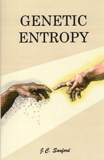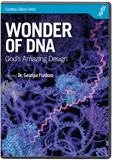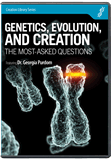
A New Headline for The Guardian
Think evolution has anything to do with Charles Darwin? If so, you’re apparently wrong, if the Guardian’s provocative headline is taken literally.
News Source
- The Guardian: “Why Everything You’ve Been Told about Evolution Is Wrong”
The headline is idiomatic, of course, but the story nevertheless reminds readers of recent twists in evolutionists’ understandings of how “evolution” works. After a rapid-fire bashing of creationists for two arguments we don’t even use, author Oliver Burkeman (who calls us “deluded or dishonest”) gets down to discussing the details of what’s “wrong” with the popular understanding of evolution.
In short, what’s wrong is the idea that an organism inherits only unmodified genetic information from its parents—at least, unmodified with the exception of mutations. Contesting that view was a study of chickens conducted at the University of Linköping, which Burkeman describes.
The researchers observed that chickens placed in a stressful situation were less capable of navigating a maze for hidden food than their unstressed peers—which is not particularly surprising. What the scientists did not expect came after the chickens were returned to their normal, unstressed environment, where the chickens
conceived and hatched chicks who were raised without stress—and yet these chicks, too, demonstrated unexpectedly poor skills at finding food in a maze. They appeared to have inherited a problem that had been induced in their mothers through the environment. Further research established that the inherited change had altered the chicks’ “gene expression”—the way certain genes are turned “on” or “off,” bestowing any given animal with specific traits.
Burkeman goes on to review other similar studies that indicate that there’s more to “evolution” than genes. Rather, it seems there is an important role for the “epigenome, the protective package of proteins around which genetic material—strands of DNA—is wrapped.” He continues:
The epigenome plays a crucial role in determining which genes actually express themselves in a creature’s traits: in effect, it switches certain genes on or off, or turns them up or down in intensity. It isn’t news that the environment can alter the epigenome; what’s news is that those changes can be inherited.
As Burkeman fairly points out, such findings distort the nature–nurture dichotomy. (The article also covers several other topics that we have omitted here; one we mention in passing is the research of Carl Woese and Nigel Goldenfeld we covered in “Creationists Only Fighting Half the Battle?”)
The creationist conclusion is that such findings aren’t really about evolution, in the Darwinian sense. Darwinian evolution goes beyond the topic of how life-forms change over time (something scientists can observe and experiment on) to positing that all life shares common ancestry. Studies such as the chicken experiment Burkeman reviews say nothing about the plausibility or historicity of Darwinian evolution; they only show that God has programmed even more adaptive ability into organisms than was previously believed.
Further Reading
- Hasn’t Evolution Been Proven True?
- Has Evolution Really Been Observed?
- Is Natural Selection the Same Thing as Evolution?
- Natural Selection vs. Evolution
- Get Answers: Arguments to Avoid, Charles Darwin, Genetics, Information Theory, Mutations, Natural Selection, Speciation
For More Information: Get Answers
Remember, if you see a news story that might merit some attention, let us know about it! (Note: if the story originates from the Associated Press, FOX News, MSNBC, the New York Times, or another major national media outlet, we will most likely have already heard about it.) And thanks to all of our readers who have submitted great news tips to us. If you didn’t catch all the latest News to Know, why not take a look to see what you’ve missed?
(Please note that links will take you directly to the source. Answers in Genesis is not responsible for content on the websites to which we refer. For more information, please see our Privacy Policy.)
Recommended Resources

Answers in Genesis is an apologetics ministry, dedicated to helping Christians defend their faith and proclaim the good news of Jesus Christ.
- Customer Service 800.778.3390
- © 2024 Answers in Genesis






